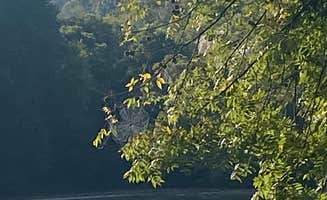Dispersed camping near Chapel Hill, Tennessee centers around the Natchez Trace Parkway corridor, where free and primitive camping options dot the rolling landscape. The region sits at elevations between 600-900 feet above sea level, creating moderate terrain suitable for both tent and small RV camping. Temperatures range from 30°F in winter to 90°F in summer with average annual rainfall of 52 inches, concentrated in spring and early summer months.
What to do
Waterfall hiking: Multiple trail systems connect to seasonal waterfalls near Meriwether Lewis Campground. "Pretty water falls not far from the camp site. History and adventure!" notes Brittni F. Be prepared for trail intersections that can confuse hikers without proper maps.
Historical exploration: Visit the historic cabin and monument where Meriwether Lewis died. "There was stuff about Meriwether Lewis, like the cabin he died in (weird I know, but kinda cool, right?!)" writes Jessica L. The interpretive center provides context about early American exploration and the Natchez Trace.
Paddling expeditions: Access primitive island camping via canoe at Goose Island - J. Percy Priest Lake. "This is a really great place to camp if you have a way to boat out to the island. We use a canoe since it's only a quarter mile or so paddle," reports Brandon.
What campers like
Clean facilities: The maintenance standards at free camping areas exceed expectations. "This place is a gem! Free water in various places, garbage cans by your site, numbered sites, paved driveways and parking spaces, manicured and litter-controlled park, and a bathroom building with multiple flush toilets for each sex and sinks with running water!" raves Lara M. about Meriwether Lewis Campground.
Spacious sites: The camping areas offer adequate room between sites, though vegetation varies. "Spots have some space between them but sparse trees for separation. I am just travelling through the area but if I lived within a days drive of here I'd be here regularly," shares Tiel M.
Wilderness feel: Despite being accessible by vehicle, many sites maintain a backcountry atmosphere. "I like campgrounds that kind of feel like you are in the backcountry and this is exactly what this felt like!" notes Jessica L. The night sky visibility is particularly notable, with minimal light pollution affecting most camping areas.
What you should know
Wildlife encounters: Prepare for nocturnal visitors, particularly at waterfront sites. "The only down side (at least when we were there) is the raccoons. They will come up really close at night begging for food. They're harmless though," warns Brandon about camping at Goose Island.
Timing considerations: First-come, first-served availability means planning arrival times carefully. "As busy as it was I still found a quiet spot. Level pads, table and fire ring at all the sites," reports David R., suggesting that even during peak periods, camping spots remain available with proper timing.
Limited stays: Free camping options typically restrict duration of stay. "You can stay for 14 days each year because, let's face it, it's too nice for them to let people hog it," explains Lara M. about Meriwether Lewis Campground.
Tips for camping with families
Trail difficulty: Select hikes appropriate for various age groups. "Trails to hike that are challenging but not too hard for kids of multiple ages," advises Brittni F., though supervision remains important near water features and overlooks.
Navigation awareness: Maintain orientation when exploring trail systems with children. "Careful on the hiking trails though, many cross paths with no directions on how to get back to camp. We wondered around for a few hours before making it out," cautions Ashley R.
Bathroom access: Facilities vary significantly between campgrounds, impacting family comfort. "Good bathhouse with flush toilets and cold water sink. No Shower. Great for tent camping," notes Anita C., highlighting the basic but functional amenities that support family camping needs.
Tips from RVers
Concrete parking: Many dispersed sites accommodate small to medium recreational vehicles with designated hardstands. "There are many concrete parking spots for RV's and spots for camping. The parking spot also has a Littering box and a table," confirms Len L. at Meriwether Lewis Campground.
Limited hookups: Prepare for self-contained camping without electrical or water connections. "I did not expect to find something like this in Tennessee! Needless to say, I was pleasantly surprised. It is a cute little campground with clean bathrooms nearby," reports Seanna M., emphasizing the tradeoff between amenities and natural setting.
Generator restrictions: Most dispersed camping areas near Chapel Hill prohibit generator use, requiring alternative power sources. "This place has everything you'll want," suggests Ruth S., though "everything" notably excludes electrical hookups or generator permissions for power-dependent RV systems.


